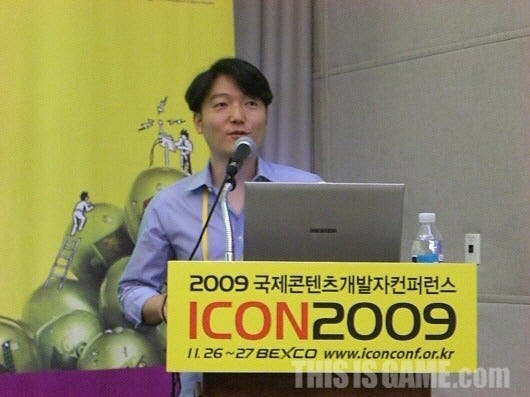ICON: What Can We Do About Game QA?
A speech from International Content Creator's Conference (ICON) 2009 in Korea given by Tae Hyo Kim at Nexon Korea. The speaker discussed the reality of QA in Korea.

[A speech from International Content Creator's Conference (ICON) 2009 in Korea given by Tae Hyo Kim at Nexon Korea. The speaker discussed the reality of QA in Korea. ]

Tae Hyo Kim
Tae Hyo Kim defined that a key to success when it comes to QA is to build professional team using QA software and achieve total quality management (TQM).
Kim understood the necessity of theories, especially when you talk to counterparts outside of your company because they wouldn’t listen to you unless you use fancy buzzwords and bringup theories, but technically reality and theory are two very different things.
■ Reality vs. Theory
Kim asked the audience to forget theories for the moment because this session was about real practice of QA in Korea.
Currently there are 3,317 game studios in Korea and the average number of employee is about 21. Most of them belong to graphic, programming and project management division.
QA staff only accounts for 3% of total employees in the gaming industry and 0% on the management level. If you look at the statistics closely, the majority of QAstaff are high school graduates and easily replaceable, and don’t require any specific educational knowledge. That makes up the perception of QA job as simple tester.
■ QA works you’ve never known
The main responsibility of QA is without a doubt to test; basic test, play test, stress test and so on. Through the series of tests, you find a problem and report to people in charge.
To conduct a test, you use a test tool which unlike oversea counterparts, Korean companies strangely do not tell you what they are using.
With a variation, companies use mostly spreadsheet as a basic tool. Kim still uses spreadsheet as well and considers it as a simple yet excellent tool.
If you need more than that, there are open source software such as Mantis and JIRA. But these are not designed specifically for game so they don’t guarantee to work with your project.
The next step from open source software is proprietary software. You can design the software to meet your specific needs in order to expedite the QA process.
Another main responsibility of QA is time management. You as a QA manager need to prioritize to fix bugs and know the schedule of other team members. Once you find a bug, assign a person then have him or her fix it.
To conduct a focus group is one of QA’s responsibilities as well. When a game is yet unknown to public, usually QA conducts an external test. Focus group is an excellent tool to gauge marketability or examine user feedback on the game.
Another reason behind conducting focus group is that is the way to persuade a development team to work on bugs. It is common even if QA puts a work request out to a development team, the chances are they don’t listen to you but they certainly listen if users speak.
To sum it up, QA’s responsibilities include test, feedback, and management but not limited to those. To find a bug, present user feedback to development team and manage a project schedule and development assets fall into QA’sresponsibilities as well.
■ The Reality
Kim concludes that QA’s job is to reduce any elements that possibly lead a project into failure and to improve game brand. QA does not necessarily limit to game testing but extend to feedback management.
A project often fails when a game developer focuses only on hiring more developers to solve a problem and not paying attention to improving the poor workenvironment.
QA’s works are very limited in a well-structured company; Not QA but marketing staff conducts market research, web development staff develops internet, and GM operates the game. But the reality is QA ends up doing all these works in a small studio.
So you need to position yourself according to a company. If it is a small studio, you might do more than QA tasks there. But if you can afford, you need to specialize QA tasks in development, publishing and operation.
About the Author(s)
You May Also Like







.jpeg?width=700&auto=webp&quality=80&disable=upscale)








